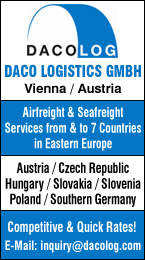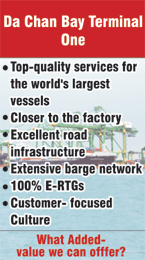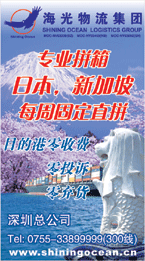|
Today's e-news sponsored by :
|
|
Powered by HKSG GROUP
|
|

|
|

|
|
The Leading Maritime & Transport News Portal
|
Monday, March 26, 2018
|

(Click on the above banner to know more)
|
|
|
|
|
|
|
|
Asia-Europe rate drops 5pc to US$704/TEU, down 7pc to USWC
SPOT rates for shipping containers from Asia to northern Europe in the week ending Friday slid five per cent to US$704 per TEU, according to the Shanghai Containerised Freight Index (SCFI).
Asia-Mediterranean trade declined 2.3 per cent to $650 per TEU. Asia to the US west coast dropped seven per cent week-over-week to $945 per FEU while those to the east coast down 3.8 per cent to $1,933 per FEU.

|
|
Burnt 15,000-TEU Maersk Honam towed to Dubai to salvage what's left
THE 15,000-TEU Maersk Honam that caught fire on March 6 off Oman with the loss of five men, is being towed to Jebel Ali port in the United Arab Emirates (UAE).
"Based on information at hand, MSC expects a substantial proportion of the cargo located behind the ship's accommodation area should be in sound condition," said Maersk 2M alliance partner MSC in a customer advisory.
"Unfortunately, we must assume, based on the details to date, that most containers located in front of the accommodation area are damaged by fire, heat or the water used to fight the fire," it said.
Investigations into the accident continue, reported Singapore's 24/7. The Indian Coast Guard, which was one of the first to arrive on the scene, said dangerous goods being carried onboard were the most likely cause of the blaze on the one-year-old giant ship.
As a precautionary measure, Maersk has stopped stowing dangerous goods by the accommodation block and engine casing across its box fleet.

|
|
ONE, Yang Ming, OOCL to start extended intra-Asia loop April 11
TAIWAN's Yang Ming, Hong Kong's OOCL and ONE, the Japanese start-up will launch an intra-Asia service connecting South China and Japan with Singapore, Malaysia and Vietnam.
The JMV (Japan-Malaysia-Vietnam) service starts April 11 with the northbound sailing of the 2,811-TEU YM Elixir from Shenzhen-Shekou bound for Osaka, Kobe, Nagoya, Yokohama, Tokyo, Hong Kong, Singapore, Port Kelang, Singapore, Cai Mep, Shenzhen-Shekou, Hong Kong and back to Osaka.
The carrier group will launch a new service connecting South China and Japan with Singapore, Malaysia and Vietnam starting in April, according to Yang Ming's online service schedules.
The JMV will operate with four vessels, one each from Yang Ming and OOCL and two from MOL, by that time part of the new Singapore-based Ocean Network Express (ONE), the merger of the Japanese Big 3 container operations - NYK, MOL and "K" Line.
According to ocean carrier schedule and capacity database BlueWater Reporting, the containerships will have an average capacity of 4,754 TEU.

|
|
China blames US for banning sale of American high tech products
CHINA blamed US export restrictions for its record trade surplus with the United States, but expressed hope that a solution can be found to settle the trade dispute before a tariff breaks out.
US President Donald Trump has announced tariffs on as much as US$60 billion against Chinese imports, Reuters reports.
Tariffs will be imposed under Section 301 of the 1974 US Trade Act, focusing on Chinese high-tech goods. President Trump said China has forced US firms to transfer their intellectual property to China as a cost of doing business there.
Chinese Foreign Ministry spokeswoman Hua Chunying said it was unfair for the US to criticise if the United States won't sell wants to buy, referring export controls on some high-tech products.
"How many soybeans should China buy that are equal to one Boeing aircraft. Or, if China buys a certain number of Boeing aircraft should the US buy an equal number of C919s?" Ms Hua said.
However, she said China still hopes it can hold constructive talks with the United States in a spirit of mutual respect to seek a "win-win" solution.
US agricultural exports to China stood at $19.6 billion last year, with soybean shipments accounting for $12.4 billion. Chinese penalties on US soybeans will especially hurt Iowa, the state that backed Trump in the 2016 presidential elections and is home to US Ambassador to China Terry Branstad.

|
|
Hi-tech is way forward for DP World: blockchain, AI and cloud
DP World chairman Sultan Ahmed bin Sulayem is adamant to move the group's business forward is thought technologies, such as blockchain, artificial intelligence and cloud computing.
"Technology is everywhere, and things like automation, robotics aren't there because we like technology, but because they now dictate our business," said Mr bin Sulayem, reported Dubai's Tahawul Tech.
"We are now looking at Blockchain, and how we can enhance our supply chain with it and remove inefficiencies. We're currently launching many technologies to enhance our IT services, including logistics platforms. Today, consumers and suppliers are our biggest driver for change, and the cargo industry is prioritising ways it can reduce shipping times.
"We see opportunities and efficiencies through technology, so investing in it is an absolute necessity for us. We need it, and needing it means having things like artificial intelligence," he said.
DP World has been on a drive to enhance its global footprint, and technology is set to be a critical pillar in the smooth operation of its 78 marine and inland terminals across 40 countries. Container handling is the firm's core business, which generates more than three quarters of its revenue, which was just announced to have hit US$4.7 billion in 2017.
Mr bin Sulayem sees five key technological areas that the firm has prioritised and will be monitoring closely over the coming years. We're seeing five types of tech innovation in our industry," he said.
"Robotics and automation; autonomous vehicles; internet of things and big data; simulation and virtual reality; and cybersecurity. In employing these technologies in our business, we're also able to review their efficiencies.
"Blockchain will bring visibility of goods in transit like never before, and by 2027, it could store up to 10 per cent of global GDP," he says.
"Supply chain intelligence, blockchain and artificial intelligence will make the global supply chain faster, cheaper and more productive. Digital supply chains also have the potential to reduce process costs by 50 per cent, procurement by 20 per cent and increase revenue by 10 per cent.
"All this requires new skills, new jobs, so our industry is creating demand for thinkers and visionaries."
DP World earlier announced a deal with India's National Investment and Infrastructure Fund to jointly invest up to $3 billion in the country, which will explore alternative ways of transporting cargo to remote locations, including via inland waterways.
Mr bin Sulayem has also met with a range of world leaders, including Canadian Prime Minister Justin Trudeau, Ukrainian President Petro Poroshenko and Peruvian PM Mercedes Araoz to explore various trade issues and infrastructure opportunities.
In Africa DP World signed an MoU with the government of Mali to develop a transportation and logistics strategy with electronic customs processes, replicating DP World's successful model with Dubai Trade at its flagship Jebel Ali port and free zone in Dubai.
DP World has also formed a partnership with Oracto to lead a new digital transformation programme across its worldwide business operations, and Mr bin Sulayem believes the partnership will be a major step to realise its digital transformation ambitions.
"Employing cloud applications that can increase efficiency, create new services and support diversification will add value for all our stakeholders and aid our vision to become a digitised global trade enabler," he said.
"The standardisation of our processes has always been our focus, as its key to enabling the flow of goods. We strive to lead the future of world trade and this requires connected infrastructure, and in this dynamic digital age, it is essential that we keep up with our customers' growing needs."
The group is also exploring ways that it can transport goods at lightning speed to its customers. The firm participated in the latest $50 million funding round for Virgin Hyperloop One, the pod-based transportation firm which will be able to transport passengers from Dubai to Abu Dhabi in 12 minutes and is now chaired by Virgin Group founder Richard Branson.

|
|
Global Ship Lease posts US$37.87 million revenue, but little else
LESS than transparent Global Ship Lease, linked to French shipping giant CMA CGM, announced a "positive return on equity of 7.79 per cent and a negative net margin of 47.19 per cent and fourth quarter revenues of US$37.87 million.
The Marshall Islands registered company announced that hedge fund Renaissance Technologies LLC raised its stake in New York-listed Global Ship Lease 7.9 per cent in the fourth quarter, according to its most recent disclosure with the Securities and Exchange Commission (SEC).
The institutional investor owned 1,338,500 shares of the shipping company's stock after buying an additional 98,300 shares during the quarter.
Renaissance Technologies owned 2.43 per cent of Global Ship Lease worth $1.55 million as of its most recent SEC filing, reports Chicago commercial research house Morningstar, which added that institutional investors and hedge funds own 6.30 per cent of the company's stock.
Global Ship Lease Inc is a holding company and containership owner that charters out of containerships. It owns 20 ships aggregating to 82,310 TEU with a "weighted average age of over 11 years, and a non-weighted average age 11.3 years.
Global Ship Lease is the result of CMA CGM selling part of its fleet in 2007. The new company, registered in the Marshall Islands is based in London, according to a filing with the US Securities and Exchange Commission at the time.
At the time, the 12 owned ships, totalling 36,322-TEU with vessels varying in size from 2,207-10,960 TEU.
All of these were to be leased to CMA CGM, for initial terms of between five and 17 years, but the goal is to broaden the portfolio to cover ships chartered to a number of different lines.
At the time CMA CGM held 30 per cent of the outstanding common shares in GSL after selling a portion of its fleet to the new venture. The cost of the initial fleet is $573 million, to be financed by a $3.3 million share sale to CMA CGM, plus $335 million from borrowings.

|
|
Cheerios maker General Mills blames regulators for truck shortage
BREAKFAST cereal giant General Mills has cut its full-year profit outlook because of looming truck shortage, reports Bloomberg.
The maker of Cheerios suffered the worst plunge since mid-2015 after shipping costs slashed profits to their lowest in years.
New government regulations, restricting hours of work and spy-in-the-cab technology, were mainly to blame for higher costs brought about by the trucker shortage, said General Mills CEO Jeff Harmening.
Operational costs have also risen as the company grapples with an industry-wide grocery price war.
General Mills is the latest company to cite higher shipping costs as a big problem, joining Hershey, Tyson Foods, Kellogg and other packaged food suppliers.
E-commerce giant Amazon has been raising fees on some of its suppliers in a bid to protect margins, while Walmart has said that higher prices to move goods has weighed on margins.
Freight costs neared a 20-year high in February, General Mills said. The company has been forced into the spot market for 20 per cent of its shipments, compared with a historical average of five per cent. The costs on those orders can be 60 per cent higher.
The go-anywhere-anytime American trucker lifestyle has been legislated out of existence by federal regulators, who now ban working days that exceed fixed time limits, requiring fixed hours of rest.
To enforce this, unfunded mandates like electronic logging device (ELD) must be in every truck using federal highways.
The American Trucking Associations (ATA), representing major truckers, praised Congress for rejecting pleas to delay implementation of the ELDs.
Opposed are the Owner-Operator Independent Drivers Association, and 16 other trade groups who say it the hardware will cost them US$2 billion in compliance costs.
Big companies already use the spy-in-the-cab to police productivity, and see these devices, coupled with restrictive hours of work, as a way to cripple smaller operators from working harder to compete, and thus winning larger market share.
The battle to avoid ELDs has so far been lost at the agency level and in court. Whether the Trump Administration will reverse this remains to be seen given its promises to reduce regulation and control regulatory costs.

|
|
INTTRA adds Namsung Shipping to its electronic freight customers
INTTRA, an electronic transaction platform and information provider for the ocean shipping industry, has expanded its rapidly growing carrier network with the addition of Korea's Namsung Shipping Co.
Namsung provides services targeting Korea to Japan, China, Hong Kong, Vietnam, Thailand and intra-Asia routes. The company will offer its customers through INTTRA's network shipping instructions, booking requests, shipping orders for north China, track and trace and ocean schedules.
"As our industry continues to embrace digitisation, a single connection to our platform links the world's top carriers to 30,000 shipping companies and in turn enables regional carriers such as Namsung to provide a higher level of customer support," said INTTRA president Inna Kuznetsova.
Said Namsung president Yongkyu Kim said: "By taking advantage of INTTRA's outstanding platform, customers will enjoy working with Namsung as we provide enhanced and specialised shipping solutions."

|
|
Shipping industry weighs value of technology in operations
SPEAKERS at the World Cargo Symposium in Dallas have been discussing the effect of digitisation with Expeditors chief strategist Phil Coughlin urging the industry to collaborate on an integrated cloud platform. Mr Coughlin said this would help digital forwarders and established forwarders to be more agile and cooperate with each other more to achieve shared benefits.
"We wind up pursuing technology, thinking it does A-Z, when it actually only does A-D," he said. "We need to avoid the hype and understand what the technology can really do. Blockchain is an interesting and valid technology, but it's at the peak of its hype. You have to work out how it will work, not chase it.
"The basis should be an innovation ecosystem, strategic partnerships. And you've got to find technology that works in a beneficial way; you've got to extract value."
American Airlines Cargo head of global operations David Vance also noted the continuing evolution of technology, London's Loadstar reported.
"You could do a lot with warehouses - there are robotics and autonomous vehicles - a place like the air cargo terminal in Hong Kong [Hactl] works perfectly," said Mr Vance.
Executives from Swiss World Cargo, which still receives about 30 per cent of its booking requests via email, said: "We have to look at how to handle the emails. Can we convert these unstructured emails into a booking? Those are the sorts of things we are talking about. You have to let the tools work for you, not you work for the tools."

|
|
Animal rights activists protest flying Canadian horses to slaughter
CANADIAN animal rights activists have petitioned Edmonton International Airport to stop flying live horses to Japan for slaughter, reports the Edmonton Journal.
"Edmonton Airport is complicit in this violent and unsavoury industry by making money from the takeoff and landing fees paid by these air cargo companies and airlines," the petition said.
Said airport spokeswoman Traci Bednard: "We don't have jurisdiction over who or what gets on the airplane."
An online petition from Voice for Animals that has amassed close to 80,000 signatures is trying to shut down the airport's involvement in the horsemeat industry.
Sinikka Crosland, of the Canadian Horse Defence Coalition, and Karin Nelson, of Voice for Animals, put the petition on Care2.com.
The group alleges the horses are being kept in conditions contrary to Canadian Food Inspection Agency standards.
"Edmonton Airport is complicit in this violent and unsavoury industry by making money from the takeoff and landing fees paid by these air cargo companies and airlines," the petition said.
The petition said the horses are kept in crates that are too small with no food or water for longer than the 36 hours outlined by Canadian guidelines, with an additional 10 to 13-1/2 hours of flight time and ground transfer in Japan.
The airport is confident regulations are being followed, said Ms Bednard.

|
|
Air cargo demand becomes harder to predict as retail evolves
ANALYSTS have sounded a warning that the lack of data on cross-border e-commerce shipments is making it harder to predict air freight demand.
They even warn of a slight slowdown in demand, although, its forecast to stay strong in the short term and the peaks are here to stay.
IATA chief economist Brian Pearce told delegates at the World Cargo Symposium in Dallas the strong cyclical upturn seen 12 months ago was partly due to low inventory levels, UK's The Loadstar reported.
"Businesses were caught out, facing a run down in their inventories. They needed to re-stock, and quickly. They hadn't anticipated the strength of consumer demand.
"But inventory restocking cycles don't last forever and businesses will turn back to cheaper modes of transport."
However, the low inventory levels could instead be related to the growing e-commerce sector, with, Logistics Capital & Strategy managing director Brian Clancey pointing to the changing shape of retail cycles and decreasing reliance on holding stock.
Unlike the conventional retail supply chain's 125-day cycle the e-commerce retail supply chain runs on a weekly cycle, meaning that stock is built to order and there is no need to hold inventory, suggesting that the inventory:sales ratio could now be a less useful indicator.
Said IATA's Mr Pearce: "Up to last year, you could explain the changes by the sales inventory. But for the current upturn we have only been able to explain about half of it," he said. "There are other things happening such as e-commerce and a rise in pharma.
"Inventory cycles are getting shorter, there are lower inventories for retailers and manufacturers and Amazon and others can get stuff moved around very quickly, so there is no need for high inventory levels.
"We are starting to see things changing that are unexplained. One big problem is the lack of data in e-commerce. There is more uncertainty, but we do take that into account."
Along with the rise in e-commerce volumes has been the lack of growth in capacity, triggered by the slowdown in air freight demand. However, demand growth significantly exceeded capacity growth in 2017.
Meanwhile, belly capacity is increasingly gaining share over scheduled freighter capacity, accounting for 67 per cent of the market in 2017 against 62 per cent in 2010.
Of future freighter deliveries, 78 per cent will be for the integrators. By 2021, 100 per cent of orders will be for the integrators, noted Seabury senior vice president Marco Bloemen.
He added that the peaks, some of which were attributable to particular commodities and regions, would remain and cause further challenges for balancing supply and demand.
Machinery parts, raw materials and hi-tech contributed most to air cargo volume growth, he said. International mail parcels grew 10 per cent between 2006 and 2016, and express grew 5.4 per cent. Air express average shipment sizes have decreased 16 per cent since 2010, an indication of growing e-commerce.
Regionally, while Chinese exports were "spearheaded" by east and south China, imports were centred around Shanghai. Germany, which saw 16 per cent air freight growth, accounted for 32 per cent of western European growth last year, while Vietnam accounted for 54 per cent of Southeast Asia's growth.

|
|
Amsterdam Schiphol makes air cargo bigger, names Pouwels chief
THE incumbent director of business development cargo at Amsterdam Airport Schiphol Bart Pouwels will starting from April 1 lead the newly enlarged cargo department, after joining the airport authority in 2008.
Mr Pouwels has 20 years of experience in the air freight sector, having started his career with Jet Services as a key account manager and moving to DHL where he spent a decade as an industry manager for the express and freight business divisions.
In his new role, Mr Pouwels will report directly to the head of aviation marketing, cargo and customer experience, Maaike van der Windt.
The new department at Schiphol will consist of five teams: cargo; route and business development; traffic analysis and forecasting; marketing and communications; and customer experience, reported Perth's Aircargo Asia Pacific.
"Pouwels, together with Saskia van Pelt and Ferry van der Ent, will continue to focus and support the air cargo industry and continue our Cargo Community initiatives," said Mr van der Windt.
"Integrating cargo into a bigger division will put cargo closer to the heart of our organisation as it increases its proximity to the airport's management board."

|
|
|
|
|

|
Copyright 2016 HKSG Group Media Ltd. All rights reserved.
|











